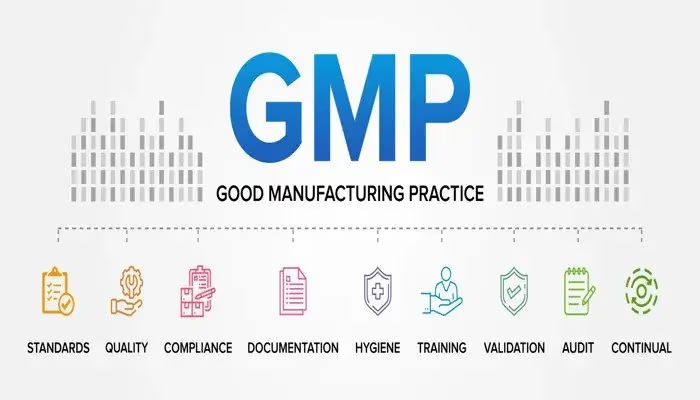Summary: In the pharmaceutical and medical fields, the Good Manufacturing Practice (GMP) ensures that medicinal products are consistently produced and controlled according to high-quality standards. The U.S. Food and Drug Administration (FDA) and other regulatory bodies established GMP, also known as Good Manufacturing Practice (GMP), to guarantee the safety and quality of medicinal products for human use.
What are Good Manufacturing Practices (GMP)?
Good Manufacturing Practices (GMP) actively ensure that pharmaceutical products are consistently produced and controlled according to established quality standards. These guidelines maintain the quality of the products throughout the manufacturing process. GMP covers all aspects of manufacturing operations, from the raw materials used to the training and personal hygiene of the staff involved in the manufacturing process. The primary goal of GMP is to ensure that the product is safe, effective, and of high quality for the end consumer.
The Importance of GMP in the Pharmaceutical Industry
The pharmaceutical industry produces medicines and other healthcare products directly impacting people’s health and well-being. Implementing GMP is crucial to ensure the safety and efficacy of these products. By following GMP, pharmaceutical manufacturers can establish robust quality management systems that guarantee the consistent production of high-quality products.
Principles of Good Manufacturing Practice GMP
Good Manufacturing Practice GMP is based on a set of key principles that guide pharmaceutical manufacturers in their pursuit of quality and safety. These principles include:
Principle 1 – Quality is the Top Priority
Quality should be the primary focus throughout the entire manufacturing process. All operations and decisions should be driven by the goal of delivering high-quality products.
Principle 2 – Establish a Strong Quality Management System
A comprehensive quality management system should be in place to control and document all aspects of the manufacturing process. This system ensures that every step is performed according to the defined procedures and standards.
Principle 3 – Maintain Proper Documentation
Accurate and complete documentation is essential in GMP. It provides a clear record of all activities, procedures, and processes, enabling traceability and accountability.
Principle 4 – Conduct Regular Training and Education
Implement training and education programs to ensure all personnel involved in the manufacturing process are knowledgeable and skilled in GMP requirements.
Principle 5 – Ensure Proper Equipment and Facilities
Appropriate equipment, facilities, and utilities should be available to support the manufacturing operations and maintain product quality.
Principle 6 – Implement a Robust Quality Control System
A robust quality control system should be established to monitor and evaluate the quality of raw materials, intermediates, and finished products. This system ensures that the products meet the required specifications and standards.
Principle 7 – Establish a System for Handling Complaints and Recalls
An effective system for handling customer complaints and product recalls should be in place to promptly address any quality issues and take necessary corrective actions.
Principle 8 – Conduct Regular Internal Audits
Internal audits should be conducted to assess compliance with GMP regulations and identify areas for improvement. These audits help ensure that the manufacturing processes are consistently meeting the required standards.
Want to streamline your manufacturing operations?
Explore how Pharmaceutical QMS can help you align with good manufacturing practices and elevate your product quality.
Compliance with GMP Regulations
Compliance with GMP regulations is mandatory for all pharmaceutical manufacturers. Regulatory bodies, such as the US Food and Drug Administration (FDA) and the European Medicines Agency (EMA), promulgate GMP regulations. These regulations outline the specific GMP requirements that manufacturers must follow to ensure the quality and safety of their products.
GMP Standards and Guidelines
Various standards and guidelines provide additional guidance to pharmaceutical manufacturers alongside GMP regulations. Organizations like the International Society for Pharmaceutical Engineering (ISPE) and the International Conference on Harmonization (ICH) develop these standards. They offer detailed recommendations and best practices to enhance GMP implementation.
GMP Requirements for Pharmaceutical Manufacturers
Pharmaceutical manufacturers must adhere to specific GMP requirements to ensure compliance. These requirements cover various aspects of manufacturing, including:
Quality Management Systems
Manufacturers must establish and maintain robust quality management systems that encompass all aspects of GMP. This includes implementing standard operating procedures (SOPs), conducting regular internal audits, and documenting all activities related to the manufacturing process.
Personnel and Training
Personnel involved in the manufacturing process should receive adequate training and education on Good Manufacturing Practice GMP requirements. This ensures that they have the necessary knowledge and skills to perform their tasks effectively and in compliance with GMP guidelines.
Facilities and Equipment
Manufacturing facilities and equipment must be designed, constructed, and maintained to meet GMP standards. Regular calibration, cleaning, and maintenance of equipment are essential to ensure the integrity and safety of the manufacturing process.
Raw Materials and Suppliers
Pharmaceutical manufacturers should establish procedures for the selection, qualification, and control of raw material suppliers. This includes conducting audits and assessments to ensure the reliability and quality of raw materials used in the manufacturing process.
Documentation and Record-Keeping
Accurate and comprehensive documentation is a fundamental requirement of GMP. Manufacturers must maintain detailed records of all activities, including batch production records, laboratory test results, and distribution records. These records serve as evidence of compliance with Good Manufacturing Practice GMP regulations.
Quality Control and Testing
Quality control measures must be implemented throughout manufacturing to ensure that products meet the required specifications and standards. This includes regularly testing and analysis of raw materials, intermediates, and finished products.
Product Packaging and Labeling
Pharmaceutical manufacturers should establish procedures for the proper packaging and labeling of products. This includes ensuring that packaging materials are of suitable quality and integrity and that labels accurately represent the product’s contents and instructions for use.
Product Complaints and Recalls
Manufacturers must have a system in place to handle customer complaints and product recalls. This includes investigating complaints, implementing corrective actions, and promptly notifying regulatory authorities when necessary.
Quality Management Systems in GMP
Quality management systems (QMS) are a critical component of Good Manufacturing Practice GMP. These systems provide a framework for managing and controlling the quality of pharmaceutical products throughout the manufacturing process. A well-designed QMS ensures that all necessary procedures, processes, and controls are in place to maintain product quality and compliance with GMP regulations.
GMP Inspections and Audits
Regulatory authorities conduct GMP inspections and audits to assess compliance with GMP regulations. These inspections can occur both planned and unannounced, and they involve thoroughly examining the manufacturing facilities, processes, and documentation. Non-compliance with GMP can result in penalties, product recalls, or even the suspension of manufacturing operations.
GMP in Manufacturing Facilities
GMP applies to all aspects of manufacturing facilities, including the design, layout, and construction. Proper facility design is essential to prevent cross-contamination, ensure adequate air filtration, and maintain appropriate temperature and humidity levels.
GMP for Medical Devices
GMP regulations also apply to the manufacturing of medical devices. The principles of GMP, such as quality management systems, documentation, and quality control, are equally important in producing medical devices to ensure their safety and effectiveness.
GMP and International Regulations
GMP regulations vary across different countries and regions. The World Health Organization (WHO) and the European Union (EU) have their own set of GMP guidelines and regulations. Global pharmaceutical manufacturers must comply with the specific Good Manufacturing Practice GMP requirements in each jurisdiction where they market their products.
Ensuring Product Quality through GMP
GMP ensures that products are consistently produced and controlled according to quality standards. By implementing GMP, pharmaceutical manufacturers can ensure the quality of their products, minimize the risk of contamination or product failures, and ultimately protect the health and safety of consumers.
Training and Education in GMP
It is essential to properly train and educate personnel involved in the manufacturing process to ensure they understand and comply with GMP requirements. Regularly conduct training programs to update employees on the latest Good Manufacturing Practice GMP guidelines, practices, and regulations.
Common Challenges in GMP Compliance
Despite the importance of GMP, pharmaceutical manufacturers may face challenges in achieving and maintaining compliance. Some common challenges include resource constraints, evolving regulatory requirements, managing supplier quality, and implementing effective corrective and preventive actions.
Conclusion
Good Manufacturing Practices (GMP) are critical in the pharmaceutical industry to ensure the consistent production and control of high-quality products. By adhering to GMP guidelines and regulations, pharmaceutical manufacturers can maintain the highest standards of quality and compliance. Implementing robust quality management systems, conducting regular inspections and audits, and providing proper training are key elements in achieving and sustaining Good Manufacturing Practice GMP compliance.
FAQ | Good Manufacturing Practices
Why is GMP important in the pharmaceutical industry?
GMP is important because it ensures the safety, efficacy, and quality of pharmaceutical products. It helps protect consumer health and ensures compliance with regulatory requirements.
What are the key principles of GMP?
The key principles of GMP include prioritizing quality, establishing a strong quality management system, maintaining proper documentation, conducting regular training, and implementing robust quality control measures.
What are the benefits of implementing GMP?
Implementing GMP in pharmaceutical manufacturing offers benefits such as product quality assurance, consumer safety, compliance with regulations, risk mitigation, international market access, customer confidence, and efficiency.
How do we ensure GMP compliance?
Regulatory authorities ensure GMP compliance by conducting inspections and audits. Manufacturers must adhere to specific GMP requirements, including quality management systems, personnel training, facilities and equipment, documentation, quality control, and product complaints handling.
Are GMP regulations international?
While GMP regulations vary across countries and regions, there are international organizations like the WHO and ICH that provide guidelines and standards for GMP.
Image: Adobe Stock – Copyright: © – stock.adobe.com





